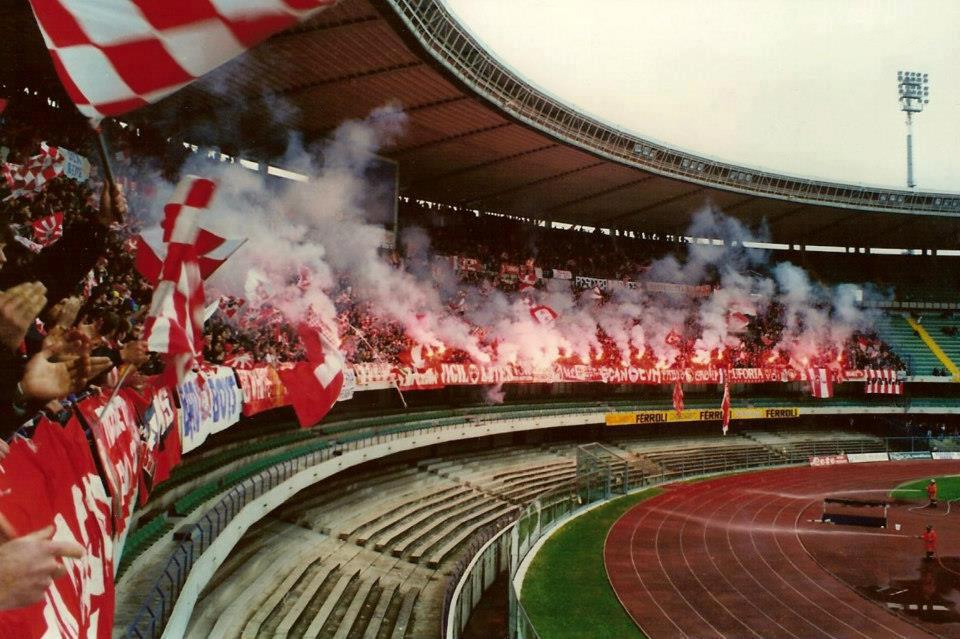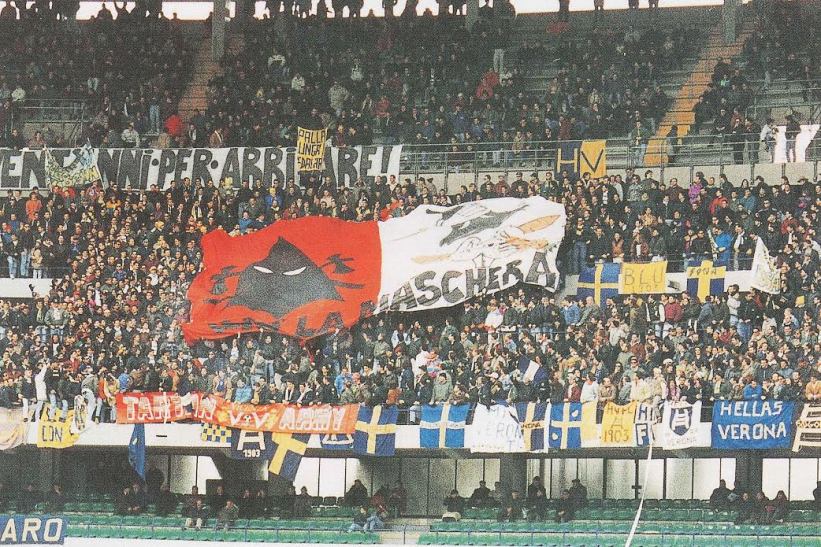According to Wikipedia, the match between Verona and Vicenza falls into the category of “Minor regional derby.” This massively understates the long-running and intense rivalry that exists between these two proud cities. In fact, because of the history attached to the fixture, it is this match, rather than that against city rivals Chievo, that fans consider to be Verona’s real derby.
While the intensity of the rivalry may have diminished in recent years, when the two Serie B sides meet at Verona’s Bentegodi on Monday afternoon, there will be more than just local pride at stake.
With four games of the season remaining, Verona are playing to secure the second automatic promotion spot (in-form SPAL are currently five points clear at the top of Serie B and look certain to claim the top spot).
Vicenza, who have recently appointed their third manager of the season, are struggling at the other end of the table, and are desperately in need of points to avoid relegation.
The rivalry between these two ancient cities dates back to the middle ages and the era of the great northern-Italian city states. At this time, Italy was a patchwork of independent towns and small principalities whose borders were shaped by fierce battles, diplomatic negotiations and marriage alliances. In Verona, economic prosperity coincided with the rise of strong and influential families who increasingly directed the affairs of the city.
Under the rule of the Ezzelini family, Vicenza (as well as Padua, Treviso and Belluno) fell under Veronese rule. Ezzelino III da Romano was a cruel tyrant who ruled over both cities for two long decades. With his demise in 1259, the Scaligeri family rose to prominence in Verona. The Scaligeri established hereditary rule over the city and led Verona into an unprecedented period of prosperity. With skilful diplomacy backed up by direct action, they ruled the city and extended Verona’s influence across the region of Veneto and beyond. Their influence over the city is apparent to this day as monuments and symbols throughout the historic centre testify. In fact, Hellas Verona are known as i Mastini (the Mastiffs) and gli Scaligeri, both references to the Scaligeri family. Even the team’s jersey features the form of two mastiffs, taken from the family’s coat of arms.
After a prolonged period of political strife and warfare, by the beginning of the 15th century the influence of the Scaligeri family was on the wane. Vicenza fell under the rule of Venice and in 1405, Verona also itself submitted to Venetian rule. As the high middle ages gave way to the early renaissance, a period of economic, cultural and artistic advancement saw a thawing in relations between the two great rivals.
Although the days of armed conflict are long gone, the sense of rivalry between the two neighbouring cities remains strong. On the football pitch, Verona and Vicenza have been battling it out since 1906, when Verona were defeated in a local tournament hosted by their near neighbours. As Tim Parks recounts in his indispensable A Season with Verona, it wasn’t until 1912 that Verona finally beat their oldest and nearest rivals.
Since then, each side has experienced both the fairy-tale highs and the gut-wrenching lows of Italian football.
After the miracle of 1984/85 when they won the Scudetto, Verona spent much of the next decade drifting between Serie A and Serie B. In 2002 they were relegated from Serie A and spent the next 11 years struggling in the lower divisions. Vicenza’s high point came in 1977/78 when, with goals coming from a certain Paolo Rossi, they finished second place in Serie A.
For Verona, it was only the appointment of Andrea Mandorlini in November 2010 that reversed the club’s fortunes. In 2013, they finished second in Serie B, a decisive moment that guaranteed their promotion to Serie A after an 11-year absence.
They started the 2013/14 campaign well, beating Milan 2-1 at home in the opening game of the season and, with players like Romulo, Juan Iturbe and veteran striker Luca Toni providing some much-needed quality, they finished the season in a respectable tenth place.
The following season they finished a disappointing 13th, but gained some consolation in an incredible performance by club captain Luca Toni, who bagged 22 goals and finished the season Serie A’s joint-top scorer alongside Inter’s Mauro Icardi.
The 2015/16 season was to be a disastrous campaign for Verona. They spent most of the season at the foot of the table and in November 2016, long-serving coach Andrea Mandorlini was sacked. Although there was an air of inevitability about their eventual relegation, a fleeting moment of consolation for their ever-loyal fans came in the last game when they beat Juve 2-1. In front of a defiant Curva, Luca Toni added yet another goal to his impressive tally, bringing his playing career to a bittersweet end.
A controversial financial parachute eased the pain of relegation to Serie B, and Verona enjoyed a positive start to the 2016/17 campaign under new coach Fabio Pecchia (previously Rafael Benitez’s number two at Napoli, Real Madrid and Newcastle). Despite two heavy defeats against Novara (4-0) and Cittadella (5-1), Verona ended the first half of the season on top of the league thanks to a convincing 3-0 victory against Cesena.
The new year saw a worrying slump in form which included a particularly barren spell in February, in which they took just two points from four games. Since then, they’ve lost only one match (a disappointing home defeat against Spezia) and, with just four games remaining, are fighting to secure the second automatic promotion spot. Verona’s veteran striker Gianpaolo Pazzini is the league’s top scorer with 23 goals this season and with around 14,000 spectators, Verona’s average attendances are second only to Bari in the league (compared to Vicenza who attract less than 8,000).
Overall, this season there’s some cause for optimism for the Veronese.
Over in Vicenza there’s less to cheer about. They are now on their third manager of the season. The first, Franco Lerda, was dismissed in October after a poor start to the season with just five points from seven games. He was replaced by Pierpaolo Bisoli, who was sacked on 18 April after failing to get the team out of the relegation zone. New manager Vincenzo Torrente has just one objective: Salvation. He drew his first match 0-0 away to high-flyers Benevento, won his second 3-1 at home against mid-table Novara and now faces Verona in his third match in charge. Vicenza fans have already snapped up 1000 tickets (a decent travelling support by Serie B standards), so the atmosphere on Monday should be intense.
Over the years, there have been many memorable derbies between these ancient rivals. For Claudio Franchini, a Veronese and Curva Sud regular through good times and bad, a 2004 derby stands out. Vicenza went 2-0 up, but in a ferocious 19-minute onslaught, Verona managed to score four goals. An incredible game, it finished 5-3 to Verona.
While Claudio finds it almost impossible to describe the atmosphere in the Curva that day, he says that: “In terms of atmosphere and emotions, the Derby del Veneto never disappoints.” It’s a game Matteo Stefano, a veteran journalist for La Gazzetta dello Sport and Il Corriere, remembers well. He compares the Derby del Veneto with an English derby, perhaps something like Newcastle versus Sunderland; two proud cities competing for regional dominance.
The 2001 derby that Tim Parks describes in the previously mentioned A Season with Verona is a typical blood-and-guts affair. It finished 2-2. Parks was struck by the performance of a promising young striker. Although he doesn’t score, he has a big impact on the match. Matteo Fontana recalls that although Danish defender Martin Laursen rarely seemed in difficulty, he struggled against the lanky Vicenza centre-forward.
The centre-forward was Luca Toni, and he was playing his first season in Serie A. This time last year, he brought his remarkable 20-year career to an end by scoring for Verona against Juve. It’s one of those remarkable symmetries that give added significance to football in general and derbies in particular.
On Monday afternoon, both sides will be hoping for some new footballing legends to be born.


